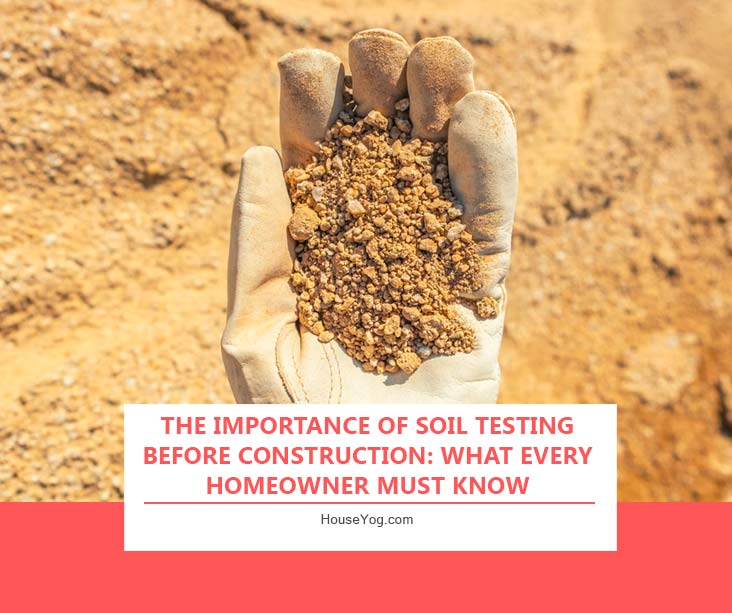Planning to Build a House? Start from the Ground- Literally.
Building a house starts long before the first brick is laid. And no matter how strong your materials or how beautiful your design is, if the soil beneath isn’t tested and understood, your dream home could be at risk.
In places like Bihar, Jharkhand, Odisha, and West Bengal, soil conditions can vary significantly from one area to another, even within the same locality. This is why soil testing isn’t just good practice, it’s a safety measure. Besides in many areas, it’s legally mandatory before sanctioning building plans.
What is Soil Testing in Construction?
Soil testing is the process of analyzing a plot’s earth to determine its bearing capacity, moisture content, compaction, and the presence of salts, clay, or organic matter.
This assessment helps structural engineers and architects:
- Design proper foundations
- Decide on the number and depth of footings
- Prevent future issues like settlement cracks, water logging, and foundation failure
Why Is Soil Testing So Important?
1. To Determine Soil Bearing Capacity
Different soils support different amounts of load. For instance, black cotton soil, common in parts of Odisha and West Bengal, swells and shrinks, making it risky for shallow foundations. Loamy soil, often found in North Bihar, has better support characteristics.
If your soil can’t bear the planned load, your structure could sink or crack – often within a few years of construction.
2. To Choose the Right Foundation Type
Should you use strip footing, raft foundation, or pile foundation?
The answer depends on soil type. Without proper soil testing, this is just guesswork.
For example:
- In Ranchi or Hazaribagh, red soil may require deeper footings
- In Darbhanga or Muzaffarpur, high water tables demand better drainage planning
3. To Avoid Water Logging & Drainage Issues
A common problem in low-lying areas of Bihar and Bengal is poor drainage. Soil testing helps identify groundwater levels, so you can plan:
- Plinth height
- Basement waterproofing
- Drainage slope
4. To Meet Legal Requirements
In many municipalities (like Patna, Ranchi, Bhubaneswar), soil test reports are mandatory before plan approval for G+1 and above structures. It is often needed for:
- Plan sanctioning
- Structural drawing approval
- Loan processing by banks
Skipping this can delay approvals or get your plan rejected.
5. To Save Future Costs
What seems like an “extra expense” now (Rs.3,000 – Rs 8,000 in most cities) can save lakhs in structural damage repair later.
Think of it as insurance for your home’s foundation.
What Does a Standard Soil Test Report Include?
A soil test report gives your architect and structural engineer the technical data needed to design a safe and long-lasting foundation. Here’s what a typical soil report includes for residential construction.
- Soil classification (clay, silt, sand, etc.)
- Moisture content
- Specific gravity
- Dry density
- Safe bearing capacity (SBC)
- Recommended foundation type
This report becomes a crucial input for your architect and structural engineer.
Soil Testing Cost in Bihar, Jharkhand & Nearby States
The cost of soil testing depends on factors like location, depth of boreholes, and testing parameters. Here’s a general estimate to help you budget – actual prices may vary based on your site and service provider.
| City | Avg. Cost (2 pits) |
| Patna | ₹3,500 – ₹5,000 |
| Ranchi | ₹3,000 – ₹5,500 |
| Bhubaneswar | ₹3,500 – ₹6,000 |
| Kolkata Rural | ₹4,000 – ₹6,500 |
(May vary by location and depth of pits. It’s always better to check the prices and ask for an official report.)
Who Should Do It?
Only hire a reputed soil testing agency or civil engineering lab. Ensure they:
- Have qualified engineers
- Provide a signed and stamped report
- Use standard borehole equipment
- Coordinate with your architect and contractor
Houseyog can connect you with soil testing partners in your area or guide you on how to schedule one.
📞 Call us at +91 75960 58808 for free consulting.
Quick Checklist: When Should You Get Soil Testing Done?
✔️ After plot purchase, before architectural design
✔️ Before starting any foundation work
✔️ If your plot is in a flood-prone or clay soil area
✔️ If the previous construction failed or collapsed
✔️ When applying for a home loan or building approval
Final Thoughts
Soil testing may not be the most glamorous step in home building – but it’s the most essential. It lays the ground (literally) for every other decision: from design to structure to safety.
Whether you’re building in Patna, Ranchi, Bhubaneswar, or a small village in West Bengal – don’t skip this step. It’s a one-time test with a lifetime of impact.Planning to build your home and unsre about where to begin? Check out our construction services in Darbhanga, Ranchi and beyond.
Need help understanding your soil report or planning your home based on it? Call us at +91 75960 58808 and speak to a Houseyog expert.
Frequently Asked Questions About Soil Testing Before Construction
Yes, in many cities like Patna, Ranchi, Bhubaneswar, and Kolkata, soil testing is mandatory before building plan approval, especially for G+1 or multi-story homes. It helps ensure structural safety and legal compliance.
Most residential soil tests are completed within 1- 2 days. However, the report preparation may take another 2-3 working days.
Soil tests should be conducted by certified civil labs or geotechnical engineers. Your architect or construction consultant can help you connect with a trusted partner.
It’s risky. Soil conditions can change dramatically even within the same lane. What worked for one plot may not work for another.
Skipping soil testing can lead to foundation damage, water seepage, uneven settlement, and legal troubles in the long run. It’s a small investment that saves you big.






